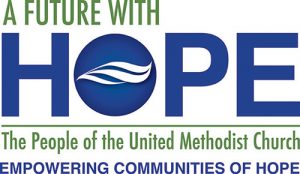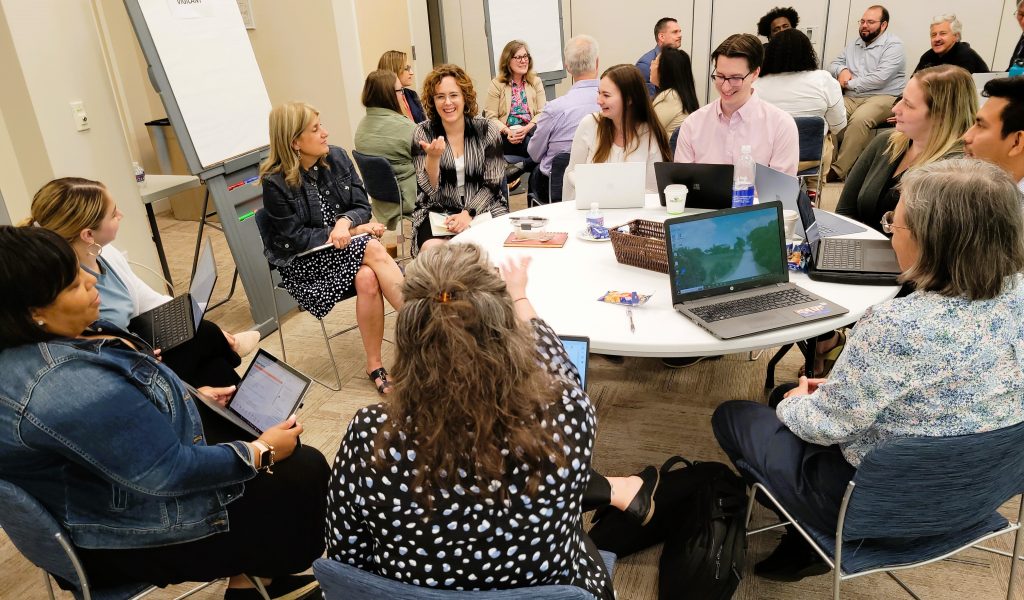The Greater New Jersey Annual Conference, May 19-21, will consider a new Memorandum of Understanding (MOU) to continue and extend the 18-month collaborative partnership between the GNJ and Eastern PA conferences (EPA&GNJ). Another resolution brings back the 2023 Strategic Direction proposal after further, collaborative development.
Among two dozen Annual Conference resolutions, the conference will also consider new policies to prevent and respond to sexual misconduct and abuse. And two resolutions submitted by the February deadline offer pending responses to decisions that General Conference may make regarding United Methodist restrictions against participation of LGBTQ persons in ordained ministry and church marriages.
Other resolutions relate to:
- Safe Sanctuaries.
- Changes in the bylaws of “A Future with Hope, Inc.”
- Leadership nominations for conference and district boards and committees for 2024-2028.
- Minimum standards and responsibilities for maintaining church-owned parsonages.
- A clergy salary arrearage policy
- Discontinuation of closed churches.
Also, the Conference is expected to approve customary resolutions for 2025, including the budget, clergy pensions and health insurance benefits, Minimum Equitable Salary, Conference Advance Specials, and enabling and approving actions taken by the Conference Board of Trustees.
Collaborative Partnership, Strategic Direction
The MOU resolution—which also will be considered by the EPA Annual Conference, May 21-23—formalizes the groundbreaking partnership that elected committees, leaders and staff of the two conferences have been working to develop for a year and a half. The historic proposal, presented by both conferences’ Connectional Table chairpersons, will further efforts at collaborative decision-making, staffing, budgeting and ministry. (See the related story to learn more about the MOU.)
The Strategic Direction resolution cites progress in meeting GNJ goals for increasing the growth and vitality of congregations, reflected in the development of their worship life, small groups, mission outreach engagement, financial stewardship and disciple-making efforts. It also affirms progress in meeting GNJ’s strategic ministry initiatives in leadership development and diversity, and progress made in “ending the sin of racism,” while strengthening racial-ethnic congregations.
That progress, the resolution reports, comes from collaboration among the conference’s Extended Cabinet and Connectional Table, along with a Strategic Direction Team and working with “our sister conference, Eastern Pennsylvania.” Thus, it calls for adoption of the resubmitted 2023 Strategic Direction proposal, with annual reports on its “implementation, progress, challenges and necessary modifications.”
Sexual misconduct policy update, response
GNJ “has not updated its sexual ethics policy since 2009,” reads a resolution proposed to do just that. It cites increased research and greater public awareness about sexual misconduct since then as reasons conference policies should be updated.
“While most ministry leaders remain faithful to their vows and their covenant with God and the church, there are ministry leaders who sometimes violate the trust given them,” reads the resolution. Relating that violation to the abuse of power, it admits that both clergy and laypersons “can engage in acts of sexual misconduct, abuse and /or harassment.”
The resolution includes definitions, a theological foundation, examples of ministerial relationships and of sexualized behavior, harassment, abuse and domestic violence. It also defines standards of conduct for clergy and laity, confidentiality and “perceptions of reality.”
A second resolution would create a Sexual Misconduct Response Team (SMRT) to assist individuals and churches when sexual misconduct is discovered. “Research has shown that responding well to sexual misconduct reduces levels of harm to individuals and churches and lessens liability,” the proposal claims. It calls for recruitment, screening, training and deployment of diverse team members, plus trauma-informed care for victims. But the response team would not be involved in any judicial or disciplinary processes.
‘A Safer GNJ’
Two 2024 resolutions relate to “A Safer GNJ,” a resolution adopted by the 2023 Annual Conference.
One asks to change an amendment to the approved policy. That amendment reads, “GNJ shall offer trauma-informed care to survivors of previous complaints, including, but not limited to reimbursement for post-traumatic stress treatment as recommended by COSROW” (Commission on the Status & Role of Women).
The change seeks to clarify that amendment by recommending the UMC’s General COSROW “Do No Harm—A Complaint Process Guide” as a guide for trauma-informed care. And it seeks to clarify that for validated abuse complaints, therapeutic care by a licensed professional, “to address issues specific to the assault,” should be paid by the conference if not by insurance.
The second resolution related to “A Safer GNJ” calls on GNJ’s Connectional Table and COSROW to co-create an online assistance portal for “victims and survivors of sexual abuse perpetrated by GNJ laity leaders and clergy members to come forward so they may get the help they need, and perpetrators may be called to account.”
It calls on the Connectional Table and Council on Finance and Administration to annually report the number of individuals who come forward and what is spent on treatment and healing. “We should take the opportunity as a Conference to take positive steps in a public fashion to create a sense of trust and safety for other potential victims and survivors to come forward with their experiences of abuse,” reads the resolution.
Safe Sanctuaries, A Future with Hope
GNJ’s Safe Sanctuaries Team is mandated to present updated/amended legislation to the Annual Conference yearly. Its 2024 update endorses the proposed Sexual Misconduct Response Team. It also proposes that churches observe Safe Sanctuaries Sunday on the last Sunday in September, with conference-supplied worship resources, and that they review/update Safe Sanctuaries policies yearly.
In addition, the team asks that all active clergy complete the Professional Ethics Development Program this year and then once a quadrennium.
 Conference members also are asked to approve changes to the bylaws of “A Future with Hope, Inc.” (AFWH), which were updated in July 2023. Organized in 2012 to provide immediate relief and long-term recovery following Superstorm Sandy, AFWH is “completing its recovery ministry and expanding into community development ministry.”
Conference members also are asked to approve changes to the bylaws of “A Future with Hope, Inc.” (AFWH), which were updated in July 2023. Organized in 2012 to provide immediate relief and long-term recovery following Superstorm Sandy, AFWH is “completing its recovery ministry and expanding into community development ministry.”
That ministry engages congregations and communities in strategic planning, organizing for systemic change and community economic development. AFWH also provides Communities of Hope training for development and resourcing of GNJ-affiliated Hope Centers to address community needs.
Two pending responses to General Conference actions*
A resolution titled “Affirm GNJ ‘A Way Forward’” calls on the Annual Conference to approve and communicate to conference and jurisdictional leaders its ongoing commitment to the “A Way Forward” resolution that GNJ adopted at a special session in 2019. That adoption came in response to actions taken at the 2019 General Conference special session.
The new resolution asks the body to affirm the adopted 2019 resolution’s call for support, full inclusion and participation of LGBTQ persons in all aspects of conference and congregational life. It also affirms commitments made in that resolution and commitments made by Bishop John Schol and other GNJ leaders to support the ministry of LGBTQ+ clergy and candidates for ministry, as well as churches in ministry with the LGBTQ+ community.
The “Providing a Path of Grace after General Conference” resolution asks the Annual Conference to permit congregations whose majority of members want to “separate for issues of conscience,” based on legislative decisions made at the General Conference, to vote on that matter after October 1. If at least 60 percent of members vote to disaffiliate from the denomination, the policy would allow them to do so if they fulfill mandated financial obligations and if the 2025 Annual Conference approves the separation.
Annual Conference resolutions had to be submitted by January, three months prior to the General Conference, which met April 23 to May 3. Thus, the resolution requests allowance, based on conference rules, for it to be altered or withdrawn pending General Conference decisions that may or may not lead to changes in the Book of Discipline.
Two other resolutions would modify conference rules related to review and reconsideration—before publication—of all submitted resolutions based on explicit or implicit bias, financial impact on the conference budget and any likelihood of being ruled out of order. Another asks for all Annual Conference members to receive a full list of pastoral appointments when it is available to help them “engage in ministry together.”
Other resolutions
In other resolutions GNJ members are expected to:
- Approve a full slate of leaders and members of conference and district boards, committees and agencies for 2024-2028, with many new leaders nominated for a new quadrennium by the Committee on Nominations & Leadership.
- Discontinue four closed GNJ churches, with “thanksgiving for all the blessings made possible by the clergy and laity who have contributed to their ministry and mission. They are: Calvary UMC, Kearny; Long Branch UMC, Asbury; Magnolia UMC, Magnolia; and Zion UMC, Dividing Creek.
- Set forth minimum standards and responsibilities for overseeing church-owned parsonages.
- Approve 10 Conference Advance Specials for the 2024-2025 conference year. They are:
- A.M.P. YDP (Community Association with a Ministry to People Youth Development Program)
- Centenary Fund/Preachers Aid Fund
- Christian Outreach Project
- CUMAC/ECHO
- First Friends of New Jersey and New York
- Immigration Law & Justice of the Delaware Valley (ILJDV)
- The Neighborhood Center (Camden)
- Pennington School
- Ranch Hope/Victory House
- The Maker’s Place.
To learn about these projects, visit the Advance Specials & Affiliated Organizations page on GNJ website. (https://www.gnjumc.org/advance-specials-affiliated-organizations/).
*The 2020/2024 General Conference removed from the UMC’s Book of Discipline and Social Principles immediately
language that describes homosexuality and that rejects LGBTQ persons from full participation in church ministry, including weddings and ordained ministry. The body also removed the expired paragraph #2553 that temporarily allowed churches to disaffiliate conditionally from the denomination while retaining property held in trust.

